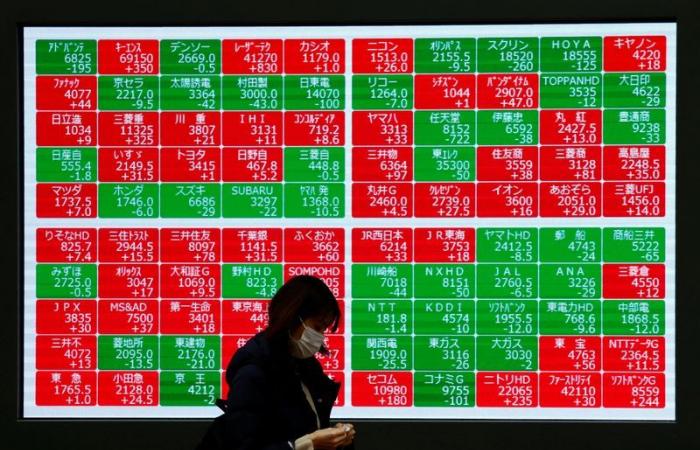Asian stocks remained near three-month lows on Friday as investors waited for key US inflation data that could either ease or worsen concerns over price pressures, while the dollar hit its highest high level for two years.
The most closely watched inflation indicator – core personal consumption expenditures – is due later in the day. Forecasts are centered on a 0.2% monthly increase for November, and any upside surprises could lead markets to further reduce bets on US policy easing next year.
Futures forecast just 37 basis points of Federal Reserve rate cuts in 2025, less than two cuts, after the U.S. central bank turned optimistic at its final meeting of the year. A rate cut is not fully expected until June.
Rates are now expected to reach 3.9% by the end of next year, which is much higher than a few months ago. This outlook has weighed heavily on the Treasury market, where benchmark 10-year yields have jumped 40 basis points over the past two weeks to exceed the key 4.5% level for the first time since may. [US/]
In Asia, MSCI’s index of Asia-Pacific stocks excluding Japan fell 0.4% on Friday and was heading for a weekly decline of 2.6%. However, it is up more than 8% over the year.
Japan’s Nikkei rose 0.2% on Friday and is up 16% for the year, partly thanks to the weakness of the yen, which has depreciated 12% in 2024 and prompted fresh warnings of intervention on the part of the Japanese authorities.
Global central banks have now completed a turbulent year of rate decisions, with the UK, Japan, Norway and Australia holding their positions, and Switzerland and Canada cutting rates by 50 basic points at their last meeting of the year. Sweden’s Riksbank cut its benchmark rate by 25 basis points, as did the European Central Bank last week.
“Taken together, it’s clear how worried central banks are about geopolitics and uncertainty in 2025,” said James Rossiter, head of global macro strategy, at TD Securities. “They have prepared with agility for a more fluid policy in 2025.
“Ultimately, uncertainty will remain high, political shocks significant, and markets will twist and turn potentially more than in the recent past. 2025 will not be an easy year.
Chinese blue chip stocks fell 0.3%, while Hong Kong’s Hang Seng rose 0.2%. The People’s Bank of China left its benchmark lending rates unchanged on Friday, in line with market expectations.
In currency markets, the dollar held at a two-year high of 108.45 against its major peers, enjoying some interest rate advantage.
It held near a five-month high of 157.5 yen, after jumping 1.7% overnight as the Bank of Japan held rates steady and Governor Kazuo Ueda struck a dovish tone in saying it would take some time to assess the wage outlook and impact of Trump’s policies.
Data on Friday showed that Japan’s core inflation accelerated in November, supporting the case for higher short-term rates. Swaps are split on the possibility of BOJ action in January, with 53% priced.
The euro is down 1.3% for the week at $1.0364, threatening a key support level of $1.0331. The British pound is on track to lose 1% on the week at $1.2489 and is on the verge of breaking the key level of $1.2484.
Treasuries appear poised for a fourth straight year of losses, with 10-year yields rising 70 basis points this year. They rose 17 basis points this week to 4.57%.
The commodities market was also affected by the strength of the US dollar. Oil prices fell on Friday, with the price of US West Texas Intermediate (WTI) oil down 0.5% to $69.06 and down 2.7% for the week.
The price of gold is expected to fall 1.9% this week to $2,598 per ounce.






